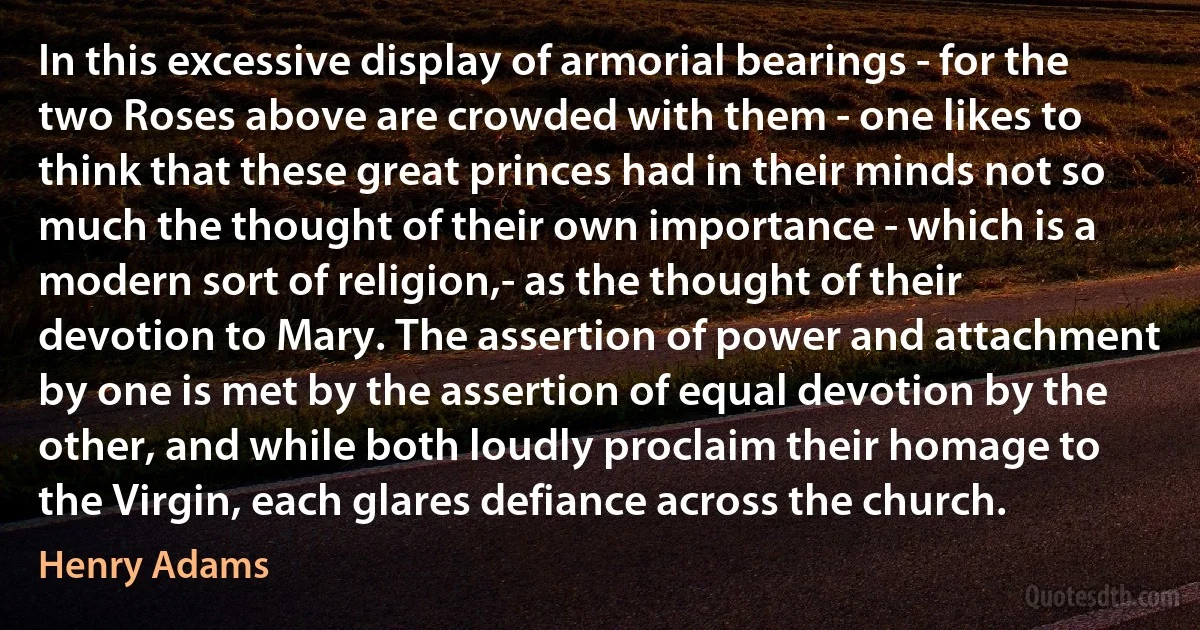Display Quotes - page 7
The Class of 1858, to which Henry Adams belonged, was a typical collection of young New Englanders, quietly penetrating and aggressively commonplace; free from meannesses, jealousies, intrigues, enthusiasms, and passions; not exceptionally quick; not consciously skeptical; singularly indifferent to display, artifice, florid expression, but not hostile to it when it amused them; distrustful of themselves, but little disposed to trust any one else; with not much humor of their own, but full of readiness to enjoy the humor of others; negative to a degree that in the long run became positive and triumphant. Not harsh in manners or judgment, rather liberal and open-minded, they were still as a body the most formidable critics one would care to meet, in a long life exposed to criticism.

Henry Adams
It was an extraordinary display! Daily did this manner of slaughter and plundering proceed. And at night the shrieks of the women captives who were being raped, deafened the ears of the people...All those heads that had been cut off were built into pillars, and the captive men upon whose heads those bloody bundles had been brought in, were made to grind corn, and then their heads too were cut off. These things went on all the way to the city of Agra, nor was any part of the country spared.

Ahmed Shah Durrani
Duran knew how to fight. He knew what to do. If he looked at the corner the only thing I ever had to do was pretend to jab, once he was using his jab I knew he'd have no trouble. Even more important he knew how to think. When you talk about great fighters, always remember there was a guy named Roberto Duran. He was never given the opportunity to really display his wares because at his peak, he was overshadowed by Muhammad Ali.

Roberto Durán
The Emperor ordered Jumdat-ul-Mulk to write to the Mutsaddis of all the subahs (provinces) of the empire that display of fire-works (atishbazi) is being forbidden. Also, Faulad Khan was ordered to arrange for announcement in the city by the beat of a drum that no one is to indulge in atishbazi.

Aurangzeb
When perfect quiet is restored, I shall proceed. I cannot speak so long as there is any noise or confusion. I shall take my time I feel quite prepared to spend the night with you if necessary. I shall take my time I feel quite prepared to spend the night with you if necessary. I very much regret that everyone who desires cannot hear what I have to say. Not that I have any display to make, or anything very entertaining to present, but such views as I have to give, I wish all, not only in this city, but in this State, and throughout our Confederate Republic, could hear, who have a desire to hear them.

Alexander H. Stephens
Certain it is, that any supposed obstructions, concerning the quality or temperature of any or every one of those worlds, could not have been any bar in the way of God Almighty, with regard to his replenishing his universal creation with moral agents. The unlimited perfection of God could perfectly well adapt every part of his creation to the design of whatever rank or species of constituted beings, his Godlike wisdom and goodness saw fit to impart existence to; so that as there is no deficiency of absolute perfection in God, it is rationally demonstrative that the immense creation is replenished with rational agents, and that it has been eternally so, and that the display of divine goodness must have been as perfect and complete, in the antecedent, as it is possible to be in the subsequent eternity.

Ethan Allen
[I]t is altogether reasonable to conclude that the heavenly bodies, _alias_ worlds, which move or are situate within the circle of our knowledge, as well all others throughout immensity, are each and every one of them possessed or inhabited by some intelligent agents or other, however different their sensations or manners of receiving or communicating their ideas may be from ours, or however different from each other. For why would it not have been as wise or as consistent with the perfections which we adore in God, to have neglected giving being to intelligence in this world as in those other worlds, interspersed with [either] of various qualities in his immense creation? And inasmuch as this world is thus replenished, we may, with the highest rational certainty infer, that as God has given us to rejoice, and adore him for our being, he has acted consistent with his goodness, in the display of his providence throughout the university of worlds.

Ethan Allen
Through a carefully cultivated display of intimidation to anyone who contemplated a meaningful challenge, the [United States] government had striven to show people around the world that its power was constrained by neither law nor ethics, neither morality nor the Constitution: look what we can do and will do to those who impede our agenda.

Glenn Greenwald
The ever-changing display of plant forms, which I have followed for so many years, awakens increasingly within me the notion: The plant forms which surround us were not all created at some given point in time and then locked into the given form, they have been given... a felicitous mobility and plasticity that allows them to grow and adapt themselves to many different conditions in many different places. ...How they can be brought together under one concept has slowly become clear to me and that this conception can be enlivened at a higher level [of consciousness]: thus I began to recognize, in the sense perceptible form, a supersensible archetype. Whoever has felt what a rich, saturated thought... has to say, will admit what a passionate movement comes to life in the spirit when we are enthused, and we anticipate the totality of what will evolve step by step..."

Johann Wolfgang von Goethe
Every place radically imbues (formally, architecturally, sociologically, politically) with its meaning the object (work creation) shown there. Art in general refuses to be implied a priori and so pretends to ignore or reject the draconian role imposed by the museum (the gallery), a role both cultural and architectural. To reveal this limit (this role), the object presented and its place of display must dialectically imply one another.

Daniel Buren
Nor, on the other hand, are there any masculine charms [in Gabriele Münter's work] either: no 'sinewy brushwork', no heaps of paint, 'hurled on to the canvas'. The pictures are painted throughout with a delicately and correctly sensed measure of external strength, with not a trace of feminine or masculine coquetry in the 'making'. We could almost say that they are painted modestly; i. e. that they were inspired, not by a desire for outward display, but by a purely inward compulsion.

Wassily Kandinsky
More than a billion women around the world want to emulate western women's lifestyles and are rapidly acquiring the material ability to do so. It is therefore vital that in our leadership we display some reserve and responsibility in our spending so that the world's finite resources will be available for our children, their children and their children's children.

Louise Burfitt-Dons



